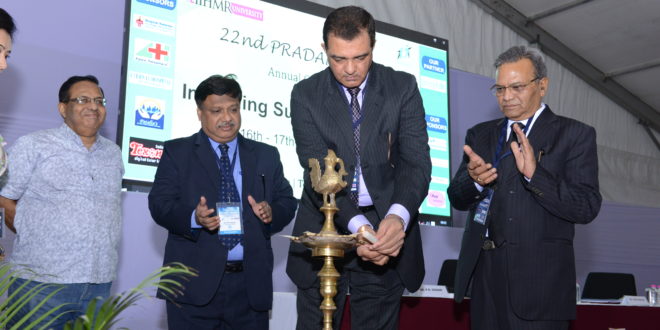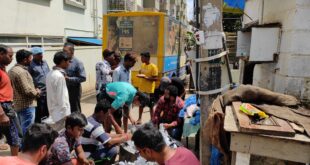· Say Health Experts at IIHMR University’s, Jaipur Conference
· They stress that there can be no development without good health
· Need to shift focus from ‘traditional healthcare’ to ‘well-managed healthcare’
· By 2030 non-communicable diseases will be 75% of the total disease burden
· Institutions must focus on effective, timely and safe medical care
Jaipur, November 17, 2017: IIHMR University, Jaipur, held a stimulating and high profile conference ‘Imagining Sustainable Futures’ on November 16-17, 2017. The conference was part of the University’s annual intellectual offering to the healthcare community called Pradanya. This was Pradanya’s 22nd edition which brought together some notable figures from the healthcare sector to ideate, debate and deliberate on the various challenges confronting the healthcare industry including public health and hospital management, development sector and pharmaceutical segments in both public and the private sector.
The conference was a huge success with more than 600 students of hospital and health management, executives and management professionals from private and government healthcare and social/development sector, in addition to doctors’ nurses, academicians, healthcare researchers, participating in it.
IIHMR University, Jaipur has created a niche for itself in high-quality research, education, and training in health, hospital and pharmaceutical management. It is recognized in national and international health circles for its outstanding work in the field.
Pradanya 2017, the much-awaited annual healthcare conference in the city, focused on the 5 ‘SMART’ issues — S for Sustainable Design And Healthcare, M For Managing Change in Disruptive Times, A for Analytics Mobility and the Cloud, R For Rurban (rural +urban) Challenges and Opportunities and T for Technological Innovation and Well Being.
Explaining the choice of themes for the conference, Dr Vivek Bhandari, President, IIHMR University said, “We chose ‘Sustainable Design And Healthcare’ because it is a concept that has proven its worth across a range of industries and has shaped important policy initiatives. ‘Managing Change in Disruptive Times’, is relevant as the world faces unprecedented global challenges caused by the parallel emergence of multiple disruptive forces. We included ‘Analytics, Mobility and The Cloud’ because of its potential, especially in clinical, financial and operational systems. ‘Rurban Challenges and Opportunities’ another important focus area of the conference exhorts us on creating smart people instead of smart cities. Technology, Innovation and Wellbeing, undeniably, need to be the future of healthcare sector.”
Pro-President, IIHMR University, Mr. P.R. Sodani, in his welcome address, stressed that smart, innovative and sustainable development is critical to transforming our lives and should be the focus of all our healthcare strategies.
Chairman, IIHMR University, Dr. S.D. Gupta underscored the fact that if people are not healthy, development cannot happen. There is a need to shift focus from “traditional healthcare to well-managed healthcare”, he said. Highlighting the key criteria for sustainable development Dr. Gupta said that while environment, social and economic conditions play an important role, the foundation of development is based on good health. “Non-communicable diseases are on the rise (by 2030 they will 75% of the total disease burden) because of behavioural and lifestyle changes. We need to keep this in mind while devising strategies for the future, he said.
Dr. Ram Narain, Executive Director, Kokilaben Dhirubhai Ambani Hospital & Medical Research Institute who was the chief guest at the Conference, said, “The biggest challenge of the healthcare industry is to create a system which is affordable, fair, acceptable and adaptable. Healthcare has become very expensive in India; 17.3% of the nation’s GDP is spent on healthcare. At present, 25% of healthcare expenses are borne by the public system and the rest 75% by the individual which is often backbreaking. We need to narrow the gap and reorient and strengthen our healthcare system.”
Executive Director went on to add that India’s healthcare system is going through a transition. It is vital to handle the medical challenges through better infrastructure, governance, altered recruitment policies and better patient care. Institutions must be focused on effectiveness and delivering timely and safe medical care.”
Eminent speakers at the conference included Dr. Anoop Daga, Director Program, AIIMS, New Delhi, Col. (Dr.) Sajal Sen (Retd.), Vice President, Columbia Asia Healthcare [North], Dr. (Maj Gen.) S. C. Pareek, Medical Director Bhagwan Mahaveer Cancer Hospital, Soham Wagh, Senior Marketing Manager, GSK Classic and Established Products (C&EP)COE, Arun Datta, Cofounder and HR Director, Doctor. Health Services Pvt Ltd. Hospital, etc.
Health experts and participants hoped that the host of ideas generated at the conference would be executed with the available resources, infrastructure, and technology in a sustainable manner.
Mr. Sandesh Kumar Sharma of the Organizing Committee of IIHMR University Jaipur proposed the vote of thanks.


